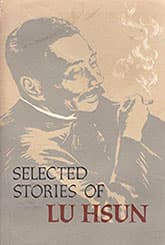The True Story of Ah Q
Critique • Quotes
 1972 collection, Peking
1972 collection, PekingFirst publication
1919
Literature form
Novella
Genres
Literary
Writing language
Chinese
Author's country
China
Length
Approx. 18,000 words
Between revolutions
The character of Ah Q in Lu Hsun's long story (or short novel) has given rise to a unique expression in China. "Ah Quism" is the attempt find spurious moral victory in a defeat. In the story Ah Q is continually defeated by his fellow lowlifes, by respectable people and by revolutionaries. Yet he keeps turning the situation around in his head afterwards.
For example, while being beaten by idlers, he loudly denigrates himself as being as low as an insect, thus showing himself to be the "foremost self-belittler"—and certainly being "foremost" in anything is admirable, isn't it? Once again he is spiritually superior to his persecutors.
For the Western reader, The True Story of Ah Q may be confusing because it seems to have no moral centre. Ah Q is motivated by self-interest, even when he tries (and fails) to join the revolution. None of his persecutors nor his victims seem to be people of any integrity. The ending is tragic but ironical. This all seems to be anarchic, black humour half a century before the style took hold in the more advanced West.
Writing in the turmoil
To really get this, you must understand the historical context. China had just gone through a bourgeois democratic revolution in 1911, overthrowing the last imperial dynasty and setting up a republican government the following year. However, the new government could not throw off foreign domination or bring about needed reforms to improve the lot of the people.
In 1919 the famous May Fourth movement began with a student protest in Beijing. Several more decades of political upheaval and bloodshed on a mass scale were to follow before the eventually victorious Maoist revolution set China on a different path.
It was in the confusing republican period that Lu Hsun was writing, placing the tale of Ah Q in the turmoil of the incomplete revolution of 1911. It was a time when many Chinese looked to Western ways to overthrow ancient Chinese traditions rooted in the feudal system. A character in The True Story of Ah Q is just referred to as the "Imitation Foreign Devil", an affluent Chinese person who adopts the fashions of the West. The "revolutionaries" in the story are an ambivalent lot, far from the ideologically driven revolutionaries who came later.
Ah Q is thus both a ridiculous figure—with his self-centred ignorance and his psychological "victories"—and a pathetic character. While laughing at Ah Q, the author and the reader somehow also understand his confusion and applaud his hapless attempts to improve his situation against all odds.
I recommend you read the story several times with a break between each reading. The first time will be spent just trying to orient yourself to the society depicted. The second and later times, the confusion will have dissipated and you'll be able to understand—and enjoy understanding—the hilarious and pathetic character of Ah Q and the society in which he attempts to rise.
The True Story of Ah Q has been published as a separate book, as the centrepiece of Lu Hsun's first great collection of stories, Call to Arms, and in the posthumous Selected Stories of Lu Hsun. Some are scarce in North America, so get whatever you can lay your hands on. You can also find the text of The True Story of Ah Q online.
— Eric
Critique • Quotes

